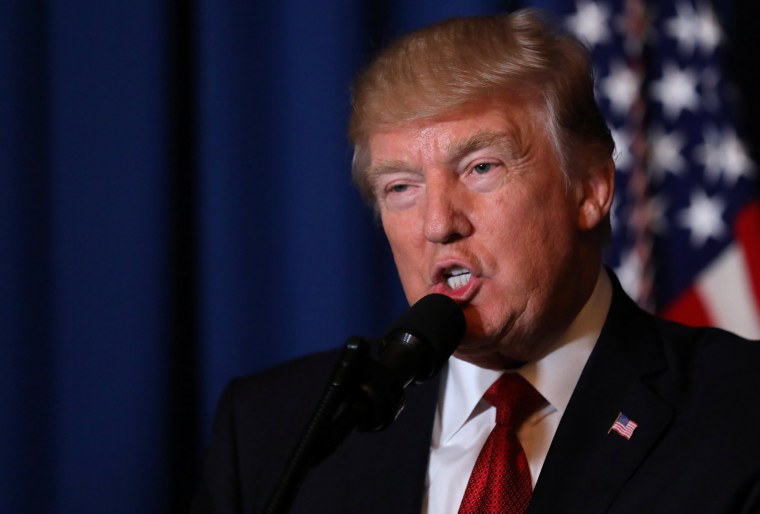Four years ago, Donald Trump tweeted bluntly, "We should stay the hell out of Syria."
That was then, and this is now: The U.S.'s decision to strike a Syrian airfield Thursday in response to a deadly chemical weapons attack this week represents a stark policy reversal for the now president.
Before he ever announced running for the White House, Trump often admonished the Obama administration's handling of Syrian President Bashar Assad, but also warned against American involvement and bombing of the war-torn nation, especially without Congressional approval.
Trump's tweets and statements in the past three years put him firmly in the camp of nonintervention — and gave no apparent indication that he would ever be open to reversing course if he one day became commander in chief:
May 2013: Two years after the start of the civil war in Syria, President Barack Obama signals that he wants nations to support a no fly-zone over the country. Trump takes issue with dealing with Syria.
June 2013: Trump tweets about Syria that the U.S. should "stay the hell out."
August 2013: In one of the biggest atrocities of the fighting, the rebel-held town of Ghouta is attacked with a suspected nerve agent, leading to as many as 1,700 civilian deaths. The attack, which the West blamed on the Syrian government, raises concern over U.S. intervention after Obama previously said the use of chemical weapons would serve as a "red line" for responding.
Obama later says in a surprise move that he will seek Congressional authorization for airstrikes against the Syrian government. Trump tweets repeatedly that it's a mistake to intervene in Syria and instead to focus on domestic issues.
September 2013: U.N. weapons inspectors report that chemical weapons were used in Ghouta, but don't conclude who was behind their use.
Trump again tweets against action in Syria and says even talking about airstrikes means the "U.S. has lost the vital element of surprise."
September 2014: The U.S. and a coalition of five Arab countries begin airstrikes against ISIS strongholds in Syria.
October 2015: Russia is in the midst of coordinated airstrikes with the Syrian government with planes conducting several strikes a day, according to reports. Civilians complain of widespread destruction. Trump is asked about intervening on MSNBC's "Morning Joe."
"Look, we have Iran and we have Russia totally on the side of Assad. And that's not the reason I stay out necessarily, but certainly it's a complicating factor. But we have them totally on the side of Assad. We have to knock the hell out of ISIS. And if we're going after Assad and ISIS and they're fighting each other, people are going to say what the hell are we doing."
December 2015: Trump says on "Meet the Press" that defeating ISIS must be a priority over removing Assad from power.
"So Assad is not a good guy, but the people that we're backing, a lot of people think they're ISIS, that we're actually backing ISIS. So what are we doing? We have to get rid of ISIS first; Assad, we think about later on."
March 2016: The Obama administration reportedly plans to hike up the number of Syrian refugees permitted into the United States. Meanwhile, Syrian forces reclaim the ancient city of Palmyra from ISIS.
October 2016: The Syrian government is in the midst of a counteroffensive bombing out insurgents in battered Aleppo, which becomes a recurring presidential campaign issue. Trump during the second presidential debate with Hillary Clinton makes news by arguing the United States should align with Russia and Syria against ISIS — putting him at odds with a previous statement made by vice presidential running mate Mike Pence.
April 4: Warplanes reportedly attack Syria's Idlib province, killing dozens. Russia says the planes belonged to Syria, and were striking a rebel workshop that housed chemical weapons — which is disputed by humanitarian groups. The White House releases a statement alluding to some sort of action.
"These heinous actions by the Bashar al-Assad regime are a consequence of the past administration’s weakness and irresolution. President Obama said in 2012 that he would establish a 'red line' against the use of chemical weapons and then did nothing."
April 5: A day after an apparent chemical weapons attack in Syria's Idlib province, killing dozens, Trump condemns the incident while hosting King Abdullah II of Jordan at the White House. He specifically said the reported death of children was a "big impact" and has led to a change in attitude toward Syria and Assad.
"Yesterday's chemical attack, a chemical attack so horrific in Syria against innocent people including women, small children, and even beautiful little babies, their deaths was an affront to humanity. These heinous actions by the Assad regime cannot be tolerated."
April 6: Trump announces authorizing a military strike against a Syrian airbase in response to the chemical attack — the first of its kind specifically targeting the Syrian government during this prolonged civil war. "Assad choked out the lives of helpless men, women and children," Trump said in remarks from Florida. "It is in this vital national security interest of the United States to prevent and deter the spread and use of deadly chemical weapons."

